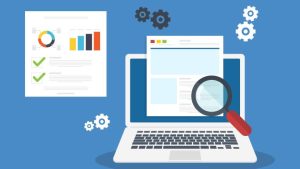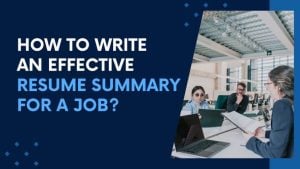How to Create a Compelling Data Analyst Resume
 Publié le 26 April 2024
Publié le 26 April 2024
Get the job you want in a growing industry by knowing how to create a compelling data analyst resume that stands out.
Businesses around the world are starting to use data in more of their operations. That’s because the rise of big data has enabled them to use information such as customer data to influence their decisions in an intelligent and well-targeted way. As well as this, data is becoming a key part of risk management, successful projects, and the creation of cross-functional teams.
With this rise in the use of data in organizations, it should be no surprise that many businesses are looking to hire data analysts. By interpreting data effectively and producing actionable insights, data analysts are becoming a crucial part of the modern business landscape.
This has had an impact on the job market: it’s predicted that there will be a 30-35% increase in demand for data analysts over the next few years. If you love data and are looking to find a career, then there’s no better place to look than in the world of data analysis.
But how can you make sure you get called for a data analyst job interview? Well, the first place to start is by creating a compelling data analyst resume that meets the requirements.
The Importance of a Data Analyst Resume
As a business data analyst, your role will come with a lot of responsibility: the data you analyze will be used in everything from supply chain forecasting models to new product designs.
That’s exactly why it’s so important for companies to ensure that they’re hiring the right analyst – which is why you need to have a great resume that will persuade them that you’re that person.
Free to use image sourced from Unsplash
First of all, a compelling resume is important because you need to hook in the reader right from the start. Put yourself in the shoes of a recruiter: they don’t have time to read all the way through every application they receive and instead, they will scan through them for key bits of information.
The resume therefore plays a crucial role in getting your key selling points in front of a recruiter – it’s all about quickly convincing them that you have the right technical skills and soft skills for a challenging and often high-paying role.
As well as this, data analyst resumes are important because they let you put across a bit of your personality to the recruiter. Once recruiters have decided that you have the skills and experience to work in the role, they want to work out whether you’d be a good fit for the organization. This can be what makes or breaks your application with regard to reaching an interview.
Essential Features of a Data Analyst Resume
Now that you know why crafting an engaging and compelling data analyst resume is so important, it’s time to consider how you can make your resume as effective as possible. Here are some of the essential features of any data analyst resume that you’ll need to include.
Name and Contact Information
It might seem obvious but you’ll need to include the basic details like your name and contact information on your resume. After all, you need to make sure recruiters can contact you easily if they decide to invite you to an interview.
However, just because it’s an obvious feature doesn’t mean that you don’t have to think about it. You want to appear professional and well-organized in every aspect of your resume and this should start with the personal information.
Free to use image sourced from Unsplash
This means you should make sure that professional emails are used and that your name is followed by your job title, such as data analyst or data engineer.
Employment History
Once your potential employers have been introduced to you, they’ll expect to see your employment history and professional experience relating to a business analyst job.
The key here is to ensure that the most relevant parts of your industry experience are explained in detail. Highlight your main responsibilities and always point out some of the main successes that you’ve had in each role. Companies lose an average of $14,900 each year on bad hires so they want to see that you’re a good bet.
However, it’s also important to remember that quality is far more significant than quantity when it comes to your employment history. Organizations looking to recruit data analysts simply won’t care about some part-time service work that you did ten years ago. If you really want, you can include stuff like this briefly but you shouldn’t spend any time detailing it.
If you’re struggling to include much work history that is clearly linked to the role of a data analyst, you might want to consider looking for internships or finding related entry-level jobs before trying to secure a job analyst role. It might help to find an internship where you can learn data engineering, for example, before looking for full business analyst positions.
Education and Skills
In this section, you should list your educational achievements. Always start with your most recent qualification but don’t go too far back to include qualifications that aren’t generally relevant to finances, data, or analysis.
You should also include some of the skills that are related to the job posting. In the world of data analysis, this will likely include key skills such as using Python or Microsoft BI and being able to create data visualizations effectively.
Free to use image sourced from Unsplash
A great education and skills section on a resume will allow you to provide evidence of impact when it comes to your analytical skills. You might explain how your skills in SQL databases allowed you to improve your company’s call center analytics software, for instance.
Top Tips for Creating an Analyst Resume
We’ve highlighted the key features of a data analyst resume so you now know what the average resume looks like. But how can you make your resume stand out from the crowd? Here are our top tips for constructing a solid and compelling data analyst resume.
Work Backward From the Job Posting
Although all data analyst roles will have similar key skills, each job has its own specific nuances. Therefore, you might want to consider directly writing your resume in response to the job posting that you’re applying to.
To do this, scan through the job specification and relevant skills that it lists. You’ll then know what to include in your resume – maybe it mentions employee self evaluations, for example, which you would respond to by showing how you’ve been able to self-assess your progress and development in your current role.
Remember Your Audience
If you’re an experienced data analyst, it can be easy to think that everyone has the same knowledge as you. However, it will often be non-specific recruiters who are tasked with the initial read-through of resumes for these jobs rather than a senior data analyst.
If you don’t want to send recruiters straight to Google to find out what are Hadoop clusters, you should remember this audience when you’re discussing your technical skills or using any tricky data-related jargon. However, you’ll still have to balance this with showing your technical knowledge.
Free to use image sourced from Unsplash
As well as this, remember that recruiters might be reading through dozens of different applications for the same job. Don’t make this process any harder than it has to be for them: instead, make sure that your writing is clear and that you break up any large sections of text into short and snappy paragraphs.
Collect Evidence
When you’re in the process of preparing to apply for data analyst roles, you should put some time aside to collect evidence of your impact. For instance, you could record your experience in project management, cloud data management, or financial analysis.
This will help you to easily compile a resume once a job becomes available, as you can quickly draw on these records to create an effective resume.
Focus on Both Technical and Business Skills
One of the important things to remember about data analysis is that it isn’t just a technical job. Instead, soft skills such as time management or people skills are just as important as technical proficiency.
This means that you should always discuss both technical and business skills in your resume. This will show the recruiter that you fully understand the demands of the role and that you have the necessary skills to thrive in it.
Data Analyst Resume: The Path to a Career in Data Analysis
Free to use image sourced from Unsplash
There’s no doubt that data analysis is one of the most promising sectors to be looking to start a career in – the WEF sees it as one of the emerging roles of the future. That’s why you should take care to create a compelling resume that stands out from the crowd.
By following our advice for creating a compelling data analyst resume – including using our example of key features and top tips such as preparing your skills in advance – you can be confident of having a resume that will persuade any employer that you’re the right person for them!







